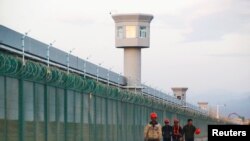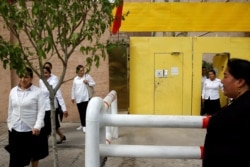Members of the U.N. Human Rights Council are divided over China's hardline policies in its Xinjiang region, where more than one million Muslim Uighurs have been detained in reeducation camps that critics say are aimed at destroying indigenous culture and religious beliefs.
Observers say Beijing has successfully used its political and economic clout to impact the impartiality of the U.N. body, citing a recent letter from 37 ambassadors, mostly from Africa and the Middle East and including Pakistan, Saudi Arabia, Algeria, and Russia, that positively evaluated the human rights developments in Xinjiang. The letter, addressed to the president of the Geneva-based council and the U.N. High Commissioner for Human Rights, proclaimed China's counter-terrorism and de-radicalization success in its western region of Xinjiang.
Days earlier, 22 mostly Western nations signed a similar letter to urge the world body to investigate China’s human rights violations in Xinjiang.
China’s Infiltration
“If [people] continue to tolerate and connive China’s infiltration into the UNHRC, people will have to be doubtful if the council can still truly remain impartial,” said Dilxat Raxit, spokesman for the exile Germany-headquartered World Uighur Congress (WUC).
The Friday statement by 37 ambassadors has not only divided the council, but also dashed the Uighurs’ hope on the council to stand up against China in order for the justice to prevail, he added.
The signatories justify China’s efforts by saying “Faced with the grave challenge of terrorism and extremism, China has undertaken a series of counter-terrorism and de-radicalization measures in Xinjiang, including setting up vocational education and training centers.”
China’s Foreign Ministry Spokesperson Geng Shuang, on Monday, voiced appreciation to the ambassadors, saying that Xinjiang hasn’t seen any terrorist attacks in the past three years and people there support the government's measures with a stronger sense of happiness, fulfillment and security, according to state media.
Anti-Beijing Stance
The 22 signatories from democratic countries including Australia, Canada, France, Germany, Japan and Britain expressed concern about “credible reports of arbitrary detention” in Xinjiang and “widespread surveillance and restrictions” particularly targeting Uighurs and other minorities.
They called on China to uphold its national laws and international commitments, including as a member of the Human Rights Council.
Aside from the geographic divergence between both letters, the pro-Beijing statement features many Muslim-majority states, which Raxit denounced as “a lack of justice” as they have turned a blind eye to Beijing’s oppression of the Muslim population in Xinjiang.
China’s economic lure?
Analysts say that economic power and potential benefits from China’s One Belt One Road Initiatives aren’t the only factors that countries weigh on when deciding to side with China or not.
“For many, China’s economic heft is a primary concern when deciding to rebuke Beijing so publicly. For other states, such as Russia, Saudi Arabia, and North Korea, their own human rights records at home have come under frequent attack abroad and so defending China becomes a roundabout way of defending themselves,” Catherine Putz, managing director of a monthly magazine The Diplomat, wrote in a commentary.
Shih Chien-yu, a Central Asian specialist from Chu Hai College in Hong Kong, argued that most of those Muslim states chose to side with Beijing for they‘ve shared a similar history of being suppressed by western imperialist powers.
They hence begin to uphold China’s role as an influential balancer in the region, he added.
“They believe that the rise of China presents them with an opportunity to strike a balance so that they no longer need to closely follow the Western world. Through China, a balance can be found between them and the west. So, in spirit, they’re more than willing to support China,” Shih said.
The professor noted that China will come under serious pressure if the United States, which doesn’t appear on either letter, takes a stance and considers sanctions on China over Xinjiang’s Uighur internment camps.
But he doubts that the United States will take any drastic move since it is now in the middle of trade negotiations with China.
WUC’s Raxit urged the United Nations to kick China out of the UNHRC for it has failed to honor its commitments as a council member.
And, instead, the U.N. Security Council should address China’s inhuman treatment of Uighurs in Xinjiang now that its human rights council is biased with China, he said.





